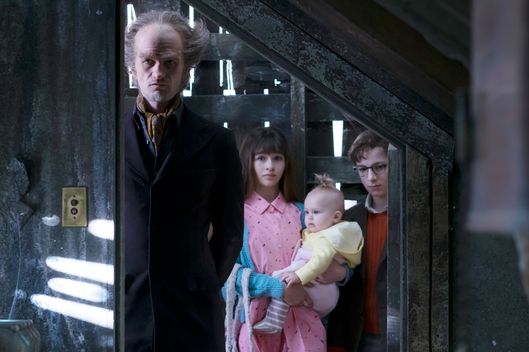Lemony Snicket Is Still Unfortunate, and That’s a Good Thing

Every episode of Lemony Snicket’s A Series of Unfortunate Events begins by imploring viewers not to watch it.
“Look away, look away,” warns the opening title song, performed by star Neil Patrick Harris and co-written by Daniel Handler, a.k.a. the “real” Lemony Snicket who wrote the book series that inspired the Netflix one, premiering Friday on the streaming network. “This show will wreck your evening, your whole life and your day. Every single episode is nothing but dismay. So look away.”
This is one of the first signs that A Series of Unfortunate Events, the second major adaptation of the Penny Dreadful–style children’s novellas, will strike the same wry, doom-and-gloom tone that the books, and, to a lesser extent, the 2004 film adaptation did.
The story of the Baudelaire orphans —Violet (Malina Weissman), Klaus (Louis Hynes), and baby Sunny (Presley Smith) — focuses on the constant, often Dickensian obstacles they encounter after losing their parents in a fire. The chief obstacle among the many they face: avoiding the clutches of Count Olaf (Harris), a sinister, greedy master of thin disguise who stalks the kids through every volume of their tragic narrative in the hope of getting his fingers on their fortune.
Things rarely go right for these siblings, and we’re constantly reminded of that in every aspect of the series, including its plot developments, the words spoken by our narrator, Mr. Snicket (played by a deadpanning Patrick Warburton), and the show’s visual style. Almost every image in A Series of Unfortunate Events has a Gothic quality and a color scheme that appears to have been fine-tuned using Instagram’s Sutro filter. The show’s look, feel, and its twisted, punny sense of humor will please admirers of Handler’s work as well as Tim Burton, two fan groups that cannot possibly be mutually exclusive.
The series — executive produced by Handler and Barry Sonnenfeld (The Addams Family), who directs four of the eight episodes — shares certain details in common with the film version, which was also co-produced by Sonnenfeld. (Sonnenfeld was supposed to direct it as well, but was replaced by Brad Silbering.)
Just as it was back in ’04, Sunny’s baby talk is translated into subtitles that reflect her rather adult attitudes. (“I prefer the music of Tito Puente,” she “says” at one point.) Violet is played by Weissman, who gives a more subdued performance than her…
Comments